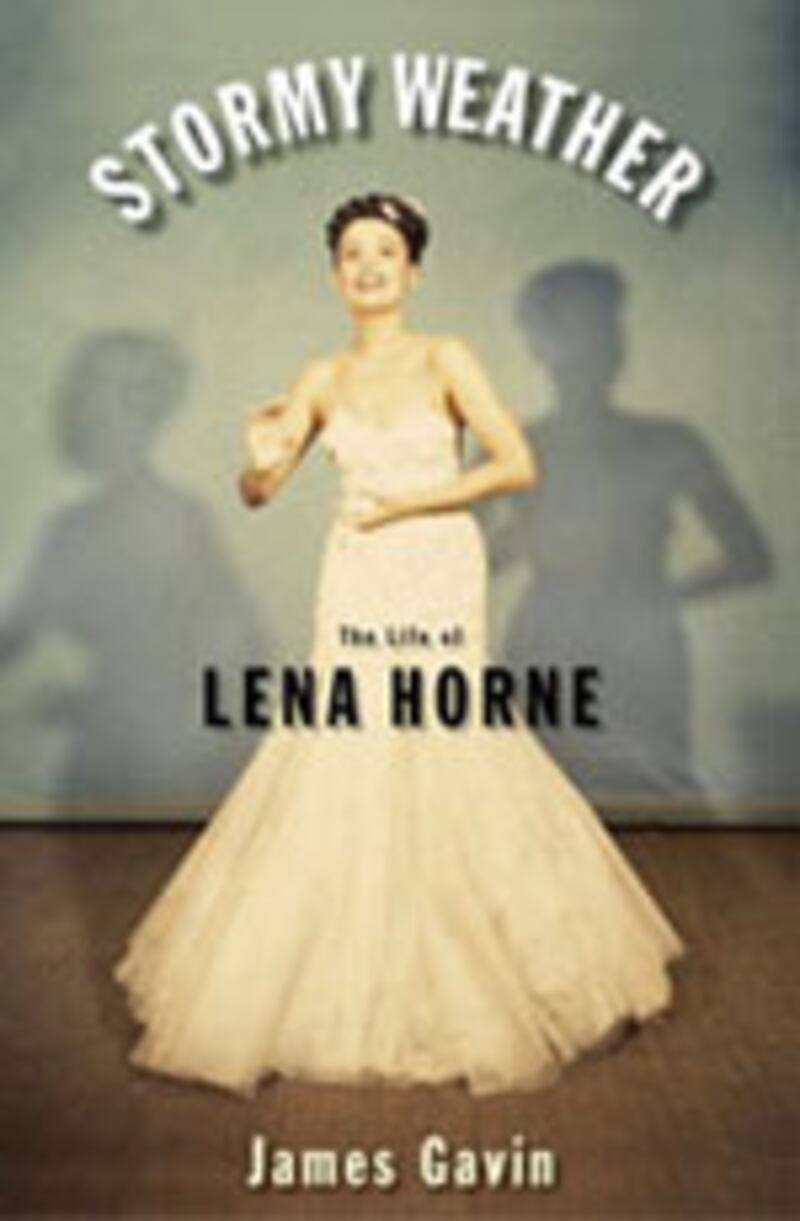Monday, February 15, 1960, was Lena Horne’s day off in a two-week engagement at the Cocoanut Grove in Los Angeles. Around midnight, she and her husband Lennie Hayton dropped by the Luau, a faux-Polynesian restaurant in Beverly Hills. Playwright Mart Crowley, who wrote The Boys in the Band, recalled the place “kitsch and camp—all these blue strobe lights and fake rain that came down over the bar.” But it gained a touch of Hollywood cachet from its owner Stephen Crane, one of Lana Turner’s ex-husbands; and a show-bizzy crowd found it an amusingly unfashionable place to hang out. The Haytons were shown to a corner table, then Lennie went to phone their friend Kay Thompson from a booth to see if she were free. Horne waited alone, amid a soft murmur of conversation.
“I’m sorry he had to learn in such a violent manner that people don’t like to be insulted. But I don’t go for that stuff.”
From the lower level, just a few feet away, a drunken voice cut through the quiet. It belonged to Harvey St. Vincent, the 30-year-old vice president of an upscale engineering firm. He sat with a friend, Norman Wynne. St. Vincent shouted for a waiter. One of them promised to come soon; first, he said, he had to serve “Miss Horne’s table.” Wynne looked up. “There’s Lena Horne,” he told St. Vincent, who glared in her direction. He raised his voice for all to hear.
“So that’s Lena Horne, huh? Well, she’s just another black n***r … there ain’t nothing they can do for me.”

According to some reports, Horne leaned over the partition and responded with dignity: “I can hear you, and I want you to stop making those insulting remarks.” Other versions had her answering much more bluntly.
“Well,” he barked, “all n***s look alike to me and that includes you.”
Horne remembered closing her eyes as a wave of fury swept over her. When St. Vincent went on to call her a “n***r bitch,” her control shattered. Trembling, she rose from her chair. Spying an ashtray filled with cigarette butts, she hurled it at his head. Then she grabbed a hurricane lamp and threw it with all her might, followed by another. St. Vincent sat there stunned, blood dripping from a gash above his left eye. Horne stared him down, “all red in the face, and evil,” she recalled. “I’d had enough.”
Seconds later, she felt Hayton grabbing her from behind. “For God’s sake, what happened?” he asked.
“He called me a n***r!”
Horne wasn’t done fighting. She clutched another ashtray and was all ready to fling it. But by then the police had come, and they rushed to St. Vincent. “Why’d she hit me?” he blubbered. “I didn’t do anything!”
Hayton was dumbfounded. “Did you hit him?” he asked. “Yes, I did!” she snapped, as though it were the dumbest question ever. Hayton headed for the man’s table, but a policeman stopped him and said, “We’re taking care of it.” Another addressed Horne accusingly.
“He’s bleeding!”
“What do you want me to do?” she sputtered. “ Apologize?”
One newspaper claimed that St. Vincent confessed his slurs to a policeman; with so many witnesses he could hardly deny them. He refused to go to the hospital or file charges; he only wanted to leave as quickly as possible. While police led him to the door, Hayton rushed Horne out of the Luau, then home to the Ambassador.
The next morning, reporters gathered outside their suite. When she opened the door, they pummeled her with questions about the night before. “He called me a name I resented, and I reacted,” explained Horne, now calm. Her phone rang all day with calls from the press. “I DON’T LIKE BEING INSULTED!” read a headline the next day in the Journal-American.
“I am not the sort of person who goes about making these incidents,” said the singer.
“I’m sorry he had to learn in such a violent manner that people don’t like to be insulted. But I don’t go for that stuff.” Time magazine published an admiring brief, noting that “few Negroes are inclined to take direct action when their race is slurred.”
She later claimed, none too ingenuously, that she couldn’t understand what all the fuss was about; whites had been insulting her for years and she often blew up at them. But the Luau incident gave her a sobering look at the truth. To her fans, she was a Hollywood star, the queen of the supper clubs, an intimate of Noël Coward and Marlene Dietrich, and an internationally renowned fashion plate. But to Harvey St. Vincent and others like him, she was “just another black n***r.”
“People thought because I was me that I wasn’t catching hell,” Horne explained. Few of them, if any, knew that her grandmother and numerous leaders in the black community had drilled her to never stoop to the level of her oppressors. Horne had tried to take a cool-headed stand every time a hotel or restaurant had refused her, but compared to the hands-on activism of W.E.B. DuBois, Rosa Parks, or even her grandmother, her own efforts struck her as meaningless, even narcissistic. “My anger had nothing to do with any movement,” she admitted to Rex Reed. “I had never made it everybody’s battle, I was just busy thinking about me.”
Copyright © 2009 by James Gavin. Reprinted by permission. Excerpted from the book Stormy Weather: The Life of Lena Horne by James Gavin published by Atria Books, a Division of Simon & Schuster, Inc.
Plus: Check out Book Beast, for more news on hot titles and authors and excerpts from the latest books.
James Gavin is the author of Deep in a Dream: The Long Night of Chet Baker and Intimate Nights: The Golden Age of New York Cabaret. His work has appeared in the New York Times, Vanity Fair, and Time Out New York, among other publications. He lives in New York City.






